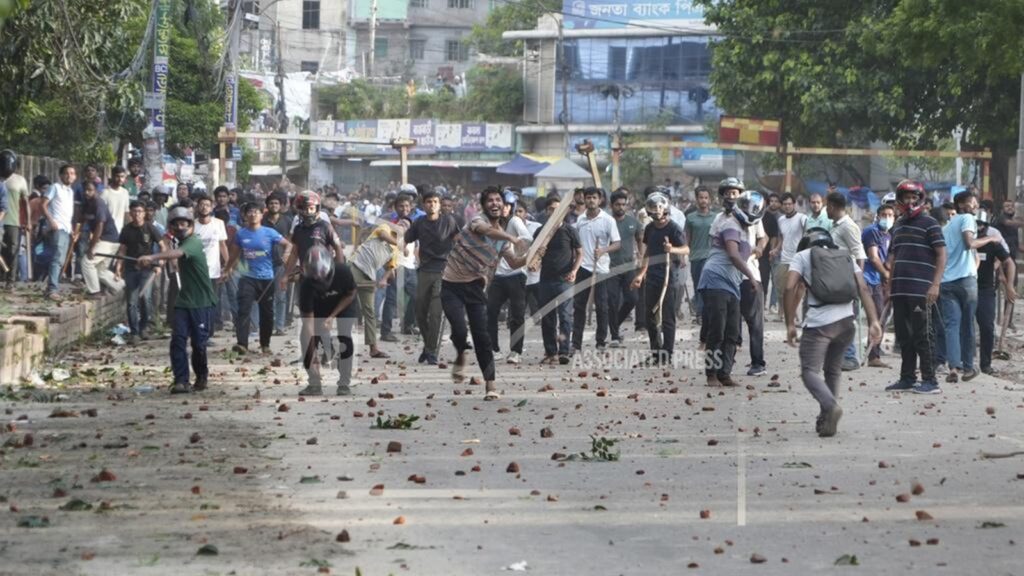Violent clashes have broken out at universities across Bangladesh as students protest against the government’s job quota system, leaving many injured. The protests were sparked by a recent Bangladesh High Court decision to reinstate a 30 percent government job quota for descendants of those who fought in the 1971 war of independence. Protesters support quotas for other marginalized groups such as women, ethnic minorities and people with disabilities, but are demanding that the 30 percent quota for veterans’ families be scrapped.
“We are not against quotas in general, but we want the 30 percent quota for the descendants of 1971 independence fighters to be scrapped,” Nahid Islam, coordinator of the anti-quota protests, told Reuters. “For many young people in Bangladesh, a government job is their only hope and this quota system is denying them that opportunity.”
 The violence first erupted on Monday at Dhaka University, the country’s leading public university, where more than 100 students were injured in clashes between protesters and members of the ruling Awami League’s student wing, the Bangladesh Chhatra League (BCL). (AP photo/Abdul Goni)
The violence first erupted on Monday at Dhaka University, the country’s leading public university, where more than 100 students were injured in clashes between protesters and members of the ruling Awami League’s student wing, the Bangladesh Chhatra League (BCL). (AP photo/Abdul Goni)
Violent clashes between protesters and pro-government student groups
The violence first erupted on Monday at Dhaka University, the country’s leading public university, where more than 100 students were injured in clashes between protesters and members of the Bangladesh Chhatra League (BCL), the student wing of the ruling Awami League party.
The unrest then spread to Jahangir Nagar University in Savar, on the outskirts of the capital Dhaka, on Tuesday morning, where protesters had gathered in front of the vice-chancellor’s residence early Tuesday morning when they were attacked by BCL activists and police, witnesses said. More than 50 people were treated overnight at a nearby hospital, with at least 30 suffering from shotgun wounds.
“The protesters were holding a peaceful demonstration when suddenly they were attacked by the BCL and police,” police official Abdullahir Kafi told the country’s main English-language newspaper, The Daily Star, according to the Associated Press. “They became violent and started attacking us, so we had to use tear gas and blank shots to disperse the crowd.” But protesters accused the BCL and police of inciting the violence.
 At Jahangir Nagar University, protesters had gathered in front of the vice-chancellor’s residence early Tuesday when they were attacked by BCL activists and police, witnesses said. (AP Photo/Abdul Goni)
At Jahangir Nagar University, protesters had gathered in front of the vice-chancellor’s residence early Tuesday when they were attacked by BCL activists and police, witnesses said. (AP Photo/Abdul Goni)
Government defends quotas as honouring 1971 independence struggle
Bangladesh’s quota system allocates 56 percent of government jobs to various groups, including 30 percent for descendants of 1971 war of independence veterans, 10 percent for women, 10 percent for people from developing regions, 5 percent for indigenous peoples and 1 percent for people with disabilities. The system was suspended in 2018 following similar protests, but the High Court last month ordered the government to reinstate the 30 percent quota for veterans’ families. That sparked the latest wave of demonstrations, with protesters arguing the system unfairly favors certain groups over others.
The Awami League, led by Prime Minister Hasina, who led Pakistan’s 1971 war of independence, has defended the quotas, saying they are necessary to honour the sacrifice of war veterans and their families. The party has also accused the protesters of being “razakars”, a term used to describe people who allegedly collaborated with Pakistan’s military during the 1971 war.
 The unrest has also taken on a political dimension, with the main opposition Bangladesh Nationalist Party (BNP) and its student wing calling for a march on Wednesday to protest attacks on anti-quota demonstrators. (AP photo/Abdul Goni)
The unrest has also taken on a political dimension, with the main opposition Bangladesh Nationalist Party (BNP) and its student wing calling for a march on Wednesday to protest attacks on anti-quota demonstrators. (AP photo/Abdul Goni)
Opposition parties join the fray
The unrest has also taken on a political dimension, with the main opposition Bangladesh Nationalist Party (BNP) and its student wing calling for a march on Wednesday to protest against attacks on anti-quota protesters. The inflammatory rhetoric has further inflamed tensions, with protesters rejecting the term “razakars” and accusing Sheikh Hasina’s government of using divisive tactics to cling to power.
Seeking a fair resolution
As unrest on university campuses simmers, analysts warn that the government’s heavy-handed response and failure to address protesters’ legitimate grievances could further fuel public anger and instability in the country. “The government needs to listen to students’ concerns and find a way to find a fair solution to this quota issue,” Mohammad Abdul Razzaque, chairman of the Committee for Development Policy and Integrated Studies, told Reuters.
“Resorting to violence and labelling protesters as anti-national will only escalate the situation and deepen divisions in Bangladeshi society,” he said.
(With inputs from Reuters, Associated Press and PTI)



